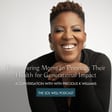
Beyond the Stigma: DBT and the Power of Acceptance with Mariah Covington
In this episode of the Sol Well Podcast, host Autumn Colon sits down with licensed mental health professional Mariah Covington to discuss the understanding of DBT (Dialectical Behavior Therapy) and its effectiveness in treating various mental health conditions. Mariah shares her personal journey and experiences working with at-risk youth, emphasizing the significance of trauma-informed care and the power of acceptance.
Key Takeaways:
- DBT's Effectiveness: Learn about the research-backed benefits of DBT for conditions like borderline personality disorder, anxiety, depression, and PTSD.
- The Importance of Acceptance: Understand the concept of radical acceptance and how it can help individuals cope with challenges and emotions.
- Overcoming Stigma: Explore the stigma surrounding mental health and DBT, and how to break down barriers to accessing treatment.
- The Role of Therapists: Discover the crucial role of therapists in providing compassionate and effective DBT treatment.
Connect with Mariah Covington:
Share your experiences and connect with other parents on our social media channels. Let's build a supportive community together!
By tuning in, you're taking a step towards prioritizing your mental health and creating a brighter future for your family.
Don't forget to subscribe to Sol Well for more inspiring stories and practical advice!
Want to be a guest on the pod? Send us an email to podcast@solwell.co





![Life after [baby] loss A conversation with Alishia Anderson image](https://media.zencastr.com/cdn-cgi/image/width=112,quality=85/image-files/61fb5028559b7100aee9f217/492cabf0-4479-488c-b19c-2873fe6bdce8.png)













